Data centers are the brains of modern business, demanding constant power. How do they achieve this unwavering reliability, and what role does the UPS play in this?
Data centers use robust, high-capacity Uninterruptible Power Supplies (UPS) to ensure continuous, clean power, preventing outages and data loss for their critical IT infrastructure, vital for 24/7 operations.
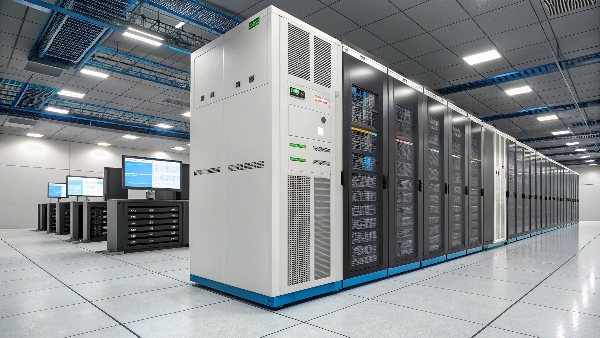
Transition Paragraph:
At Daopulse, with our decade of experience in manufacturing UPS systems, we've seen the evolution of data center power needs. My core insight is that data center uninterruptible power supplies operate 24/7. Both modular and high-frequency UPS units are commonly used. This constant vigilance is non-negotiable for facilities that underpin our digital economy. Clients like Mr. Li, a Procurement Manager overseeing hospital infrastructure which includes sensitive data systems, rely on this continuous protection. The stakes are too high for anything less.
What kind of UPS do data centers use?
Data centers demand extreme reliability. Not just any UPS will do. What specific types of UPS systems are deployed to meet these stringent requirements?
Data centers typically use large, three-phase, online (double-conversion) UPS systems. Modular UPS designs are increasingly popular for scalability and maintainability, alongside traditional monolithic high-frequency units.
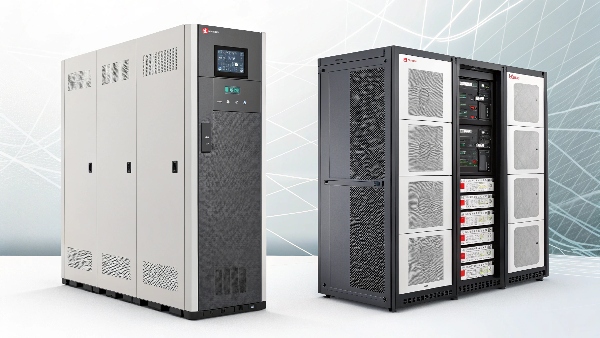
The power demands of a data center are immense and highly critical. Therefore, the UPS systems employed are sophisticated and robust. At [Your Company Name], we specialize in these high-performance solutions. Here's what you'll typically find:
- Three-Phase Power: Most data centers operate on three-phase electrical power due to their high load requirements. Consequently, their UPS systems are also three-phase, capable of handling significant KVA (kilovolt-ampere) or MVA (megavolt-ampere) capacities.
- Online (Double-Conversion) Topology: This is the gold standard for data centers. An online UPS continuously converts incoming AC power to DC (to charge batteries and feed the inverter) and then inverts it back to clean AC for the IT load. This provides the highest level of protection by completely isolating the load from raw utility power disturbances.
- Monolithic UPS: These are traditional, large, single-unit systems. They have been the workhorses for years and are known for their robustness.
- Modular UPS: This is a growing trend, and one we actively develop. My insight that data center uninterruptible power supplies operate 24/7, and generally, modular or high-frequency units are suitable, points to this. Modular systems consist of multiple smaller power modules that can be added or removed (often hot-swapped) as needed. This offers:
- Scalability: Pay as you grow. Add capacity when demand increases.
- Redundancy (N+1, N+X): If one module fails, others seamlessly take over.
- Maintainability: Faulty modules can be replaced quickly without taking the entire UPS offline, improving Mean Time To Repair (MTTR).
- High-Frequency UPS: These often refer to transformerless designs which are typically more compact, lighter, and can offer higher efficiency compared to older, transformer-based designs. Both monolithic and modular UPS systems can utilize high-frequency technology.
Choosing between these depends on factors like the data center's size, criticality, growth plans, and budget. We work closely with clients to determine the optimal configuration.
| UPS Type | Key Characteristics | Common Use Case in Data Centers |
|---|---|---|
| Online (Double-Conversion) | Highest protection, continuous power regeneration | Standard for nearly all data centers |
| Three-Phase | Handles high power loads | Essential for medium to large data centers |
| Monolithic | Single, large unit, established technology | Large deployments, fixed capacity needs |
| Modular | Scalable, redundant, easily serviceable power modules | Growing data centers, high availability requirements |
| High-Frequency | Often transformerless, compact, higher efficiency | Widely used in both monolithic and modular designs |
How much does a UPS system cost for a data center?
Budgeting for data center infrastructure is complex. UPS systems are a vital component. What kind of investment is required for this critical power protection?
The cost of a data center UPS system varies massively, from tens of thousands to millions of dollars, depending on capacity (kVA/MW), redundancy level, battery type (lead-acid vs. lithium), and brand/features.
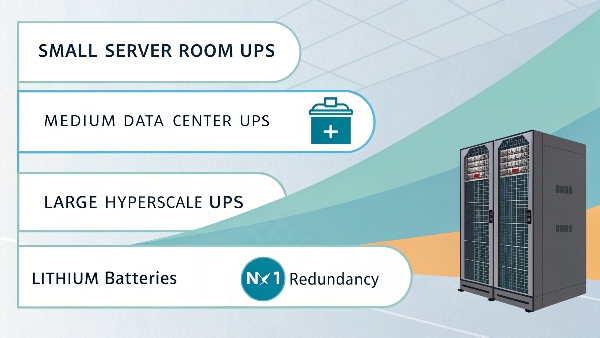
Pinpointing an exact cost for a data center UPS is like asking "how much does a car cost?" – it depends on many variables. As manufacturers at Daopulse, we provide custom quotes based on specific needs. Here are the primary drivers:
- Capacity (kVA/kW or MVA/MW): This is the biggest factor. A small server room might need a 20kVA UPS, while a large data hall could require multiple units totaling several megawatts. The larger the capacity, the higher the cost.
- Redundancy: Configurations like N+1 (one extra module/unit for backup) or 2N (fully redundant parallel systems) increase reliability but also cost. Data center uninterruptible power supplies operate 24/7, so redundancy is often non-negotiable for higher-tier facilities.
- Battery Type and Runtime:
- Lead-Acid Batteries: Lower upfront cost, but require more frequent replacement and a larger footprint.
- Lithium-ion Batteries: Higher initial investment, but offer longer life, smaller size, less weight, and better performance, potentially lowering Total Cost of Ownership (TCO). We offer both.
- Runtime: How long the UPS needs to support the load on batteries (typically 5-15 minutes to allow generators to start) impacts the size and cost of the battery bank.
- Brand and Features: Established brands with advanced monitoring, management software, and higher efficiency ratings might command a premium.
- Ancillary Costs: Don't forget installation, commissioning, electrical switchgear, and ongoing maintenance contracts.
For a very rough idea:
- A UPS for a small data room (e.g., 50-100kW) might be in the $20,000 - $100,000 range.
- A UPS for a medium-sized enterprise data center (e.g., 500kW - 1MW) could be $100,000 - $500,000+.
- Large hyperscale facilities can spend millions on their UPS infrastructure.
Procurement managers like Mr. Li need to balance upfront costs with long-term reliability and TCO.
Do data centers need power 24/7?
In our always-on digital world, this question seems obvious. But just how critical is uninterrupted power for a data center's function and survival?
Yes, absolutely. Data centers are designed and built to operate 24 hours a day, 7 days a week, 365 days a year. Any power interruption can lead to catastrophic data loss, service outages, and financial repercussions.
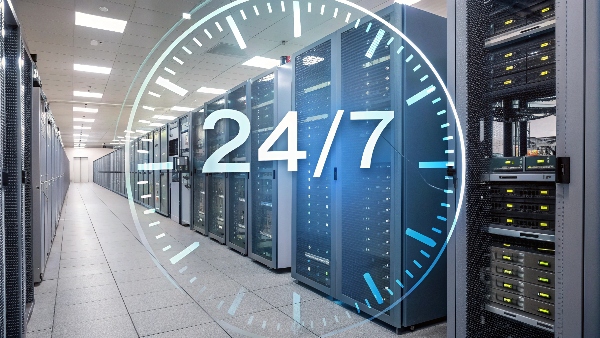
The very purpose of a data center is to provide continuous, reliable access to data and applications. Think about the services they support: cloud computing, e-commerce, banking transactions, healthcare records, streaming services, social media. None of these can afford to "close" or go offline unexpectedly. My core insight is that data center uninterruptible power supplies operate 24/7, precisely because the facilities they protect must operate 24/7.
At Daopulse, we understand this profound need for uptime. Here's why 24/7 power is non-negotiable:
- Data Integrity: Sudden power loss can corrupt data being written to disk or held in server memory. This can be irretrievable.
- Service Availability: Businesses and consumers rely on data center services being constantly available. Downtime means lost revenue, damaged reputation, and frustrated users. Service Level Agreements (SLAs) often guarantee very high uptime percentages (e.g., 99.999%).
- Operational Continuity: Many internal business processes rely on data center resources. An outage can halt a company's operations.
- Complex Systems: Modern IT systems are not like simple appliances. Restarting a large data center environment after a full shutdown is a complex, time-consuming process, not just a flick of a switch.
This is why data centers invest heavily in redundant power infrastructure, including multiple utility feeds (where possible), backup generators, and, crucially, UPS systems to bridge any gaps and condition power. The entire power chain is designed for continuous operation.
How long should a data center UPS last?
We've established that data center UPS systems are critical and operate continuously. But what is their expected operational lifespan, considering this constant demand?
The UPS hardware (electronics) in a data center can last 10-15 years or more with proper maintenance. Batteries, however, need replacement every 3-5 years (lead-acid) or 8-10+ years (lithium-ion).
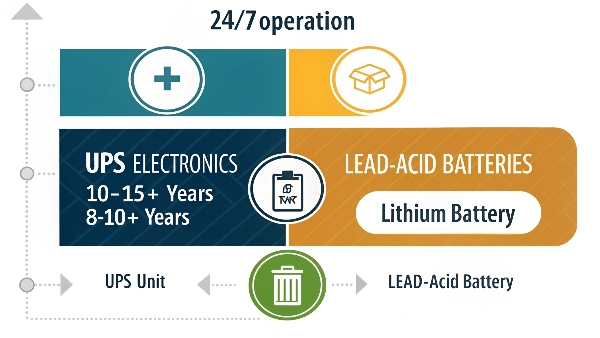
Even though data center uninterruptible power supplies operate 24/7, the core electronics are designed for longevity. At Daopulse, we build our UPS systems for durability, knowing they will be in constant service. The key components like inverters, rectifiers, and control systems, if properly maintained in a suitable environment (temperature, humidity, cleanliness), can reliably function for 10 to 15 years, and sometimes even longer. Proactive maintenance, including periodic checks, fan replacements, and capacitor servicing, is vital to achieving this lifespan.
The batteries, however, are a different story. They are consumable components with a finite service life, even in a perfectly managed UPS.
- Sealed Lead-Acid (SLA) Batteries1: These are the traditional workhorses. In a 24/7 data center environment, with optimal conditions and float charging, they typically last 3-5 years before their capacity degrades significantly and they need replacement.
- Lithium-ion Batteries2: Becoming increasingly favored, especially for their longer lifespan of 8-10 years or more. They also offer benefits like higher energy density (smaller footprint), lower weight, and better tolerance for temperature variations, which can reduce overall cooling costs. While the initial investment is higher, the longer life and reduced maintenance can lead to a lower Total Cost of Ownership (TCO)3.
My insight is that data center uninterruptible power supplies operate 24/7, and generally, modular or high-frequency units are suitable. This continuous operation places constant demands on the batteries to be ready. Regular testing and timely replacement of batteries are paramount to ensuring the UPS can perform its critical function when called upon. Neglecting battery health is one of the biggest risks to data center uptime.
| Component | Typical Lifespan (24/7 Operation) | Maintenance Considerations for Longevity |
|---|---|---|
| UPS Electronics | 10-15+ years | Clean environment, regular PM, load management |
| Lead-Acid Batteries | 3-5 years | Temperature control, float voltage, testing |
| Lithium Batteries | 8-10+ years | BMS monitoring, temperature, cycle management |
Conclusion
Data center UPS systems, operating 24/7, are critical. They utilize online, often modular or high-frequency three-phase units, ensuring constant, clean power, with lifespans depending on electronics and battery types.
-
Explore this link to understand the pros and cons of SLA batteries, which are crucial for data center operations. ↩
-
Discover the advantages of Lithium-ion batteries, including their lifespan and efficiency, essential for modern data centers. ↩
-
Learn how TCO influences battery choices, helping you make informed decisions for cost-effective data center management. ↩

